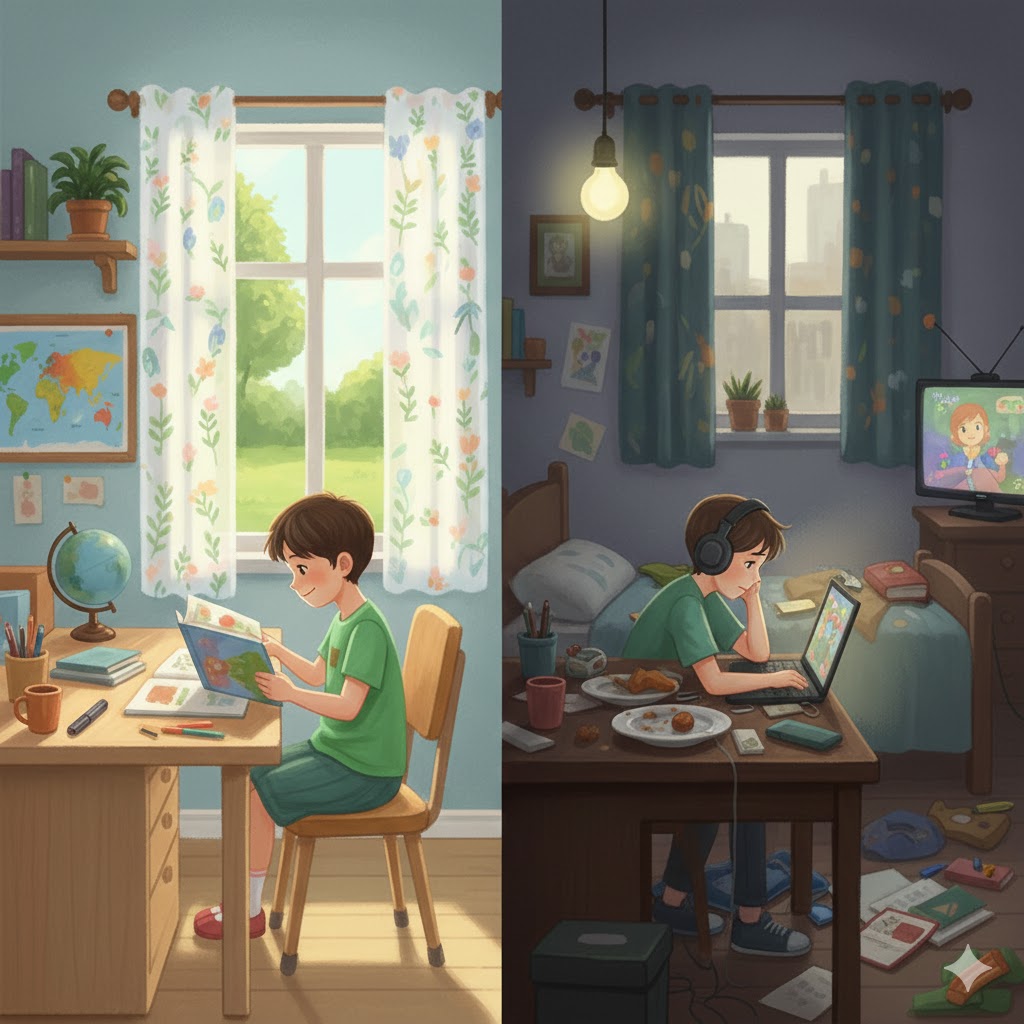
Our environments affect us.
If its easy to procrastinate we will.
If its easy to make excuses, we will.
The same is true for your child/children.
If they aren’t tidying up, or reading, or using their toys as much as they should, most likely its because its too hard.
If your child has lots of books to choose from and every time they pull one out, the others fall down, they probably won’t choose that as an activity.
Fewer books, easy to pick up and put away – without needing help – will encourage them to read more.
In a previous post I spoke about using small trays and boxes for each separate toy.
This makes it easy to use, play and tidy up.
Children get overwhelmed with clutter or too much choice.
As they get older every child should have his or her own dedicated learning space.
This might be a simple desk in their bedroom or a dedicated study of their own, depending on what you can accommodate.
Preteens and teens should have a substantial say in what their area looks like and they should be solely responsible for keeping it clean and tidy.
Nagging teens to clean their room and workspace is mostly ineffective.
Non-Physical Aspects of a Successful Homeschooling Environment
A learning environment is more than the physical space.
What is the energy or general mood in your home?
Do your children feel safe and secure?
Are there constant, unpredictable visits from family/friends?
Is their constant bickering between the adults?
Do the adults in the household model behaviour like reading and studying on a regular basis?
Does the TV schedule dominate the household activities?
What kinds of hobbies are encouraged and supported?
Are grandparents constantly interfering or changing plans?
If you are considering homeschooling or currently are homeschooling and things are not going the way you want, think deeply about those questions.
Children are affected by ‘small’ things more than we realise.
What do children need to learn effectively?
1 – Sometimes children just need to be.
Downtime is underrated and yet is so important for our brains to process things we have learnt or studied during the day or week.
2 – Children need space and time.
If your child is working on a project or problem, leave them to it. Constant interruptions to tidy their room or help with house chores is unproductive. It ruins their trail of thought.
3 – The right type of praise and validation.
The book ‘how to talk to kids‘ does a great job of explaining praise and how to use it effectively. Though the book is for 2 to 7 years, I find it applicable to all ages.
How do you keep children interested in core topics like maths, reading and science etc?
1 – Show interest yourself whilst your children are young. If they see you studying maths they will get curious. Also at a young age, children generally want to copy their parents/main carers.
2 – As they start to show interest in a subject don’t pressure them too much about it. Let them go at their own pace with it.
3 – Do NOT reward their learning. This will kill their intrinsic motivation and change their focus and reasons for studying in a negative way.
4 – Always build your relationship with your child. This is the key to helping them become successful at whatever they pursue and keeps them open to your influence.

Comments
You make some great points in your post and I certainly agree about decluttering. I do disagree about having lots of books in the home however, be it for children or otherwise. Research shows that being surrounded by books at home increases the love for books and indeed literacy in children/ young adults. See below link and there are many other articles about this.
https://www.theguardian.com/books/2018/oct/10/growing-up-in-a-house-full-of-books-is-major-boost-to-literacy-and-numeracy-study-finds
Books are a beautiful privilege. And being surrounded by them creates wonder. I would suggest putting a book basket in each room to encourage kids to pick and read wherever they are and this also allows for a tidier space, as well as having a home library if space allows. Books can always be rotated for enjoyment.
Thank you so much for your input 🙂
I completely agree with having lots of books – I have lots of books in every room!
I was referring more for younger children in terms of the books they are able to reach and choose from, keeping them a little bit less and then rotating the books or increasing the amount as they get older and when they get better at tidying/reaching more shelves etc. so that they don’t get overwhelmed at a young age and enjoy the process of choosing a book etc.
Apologies if that wasn’t clear in the article x